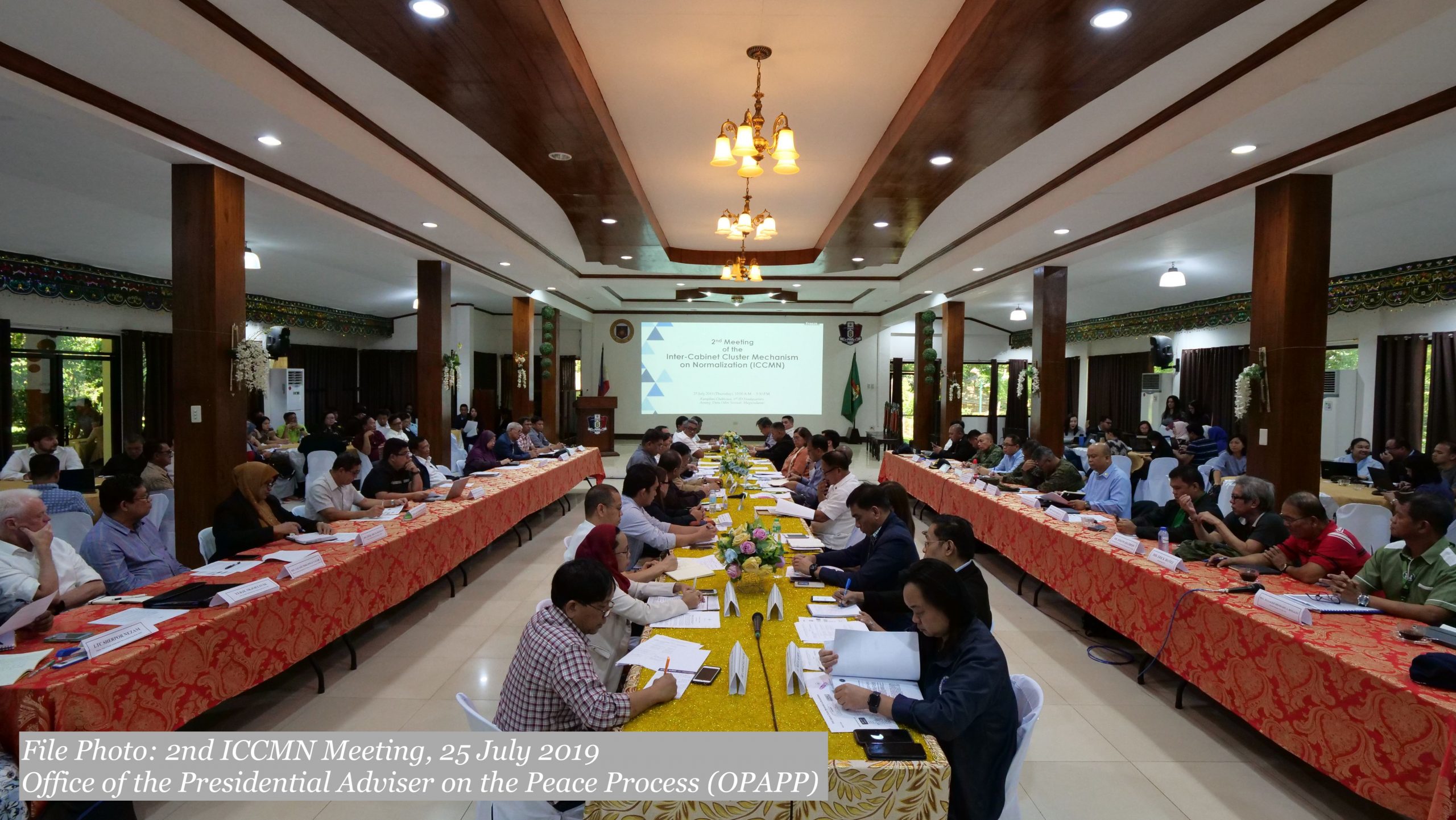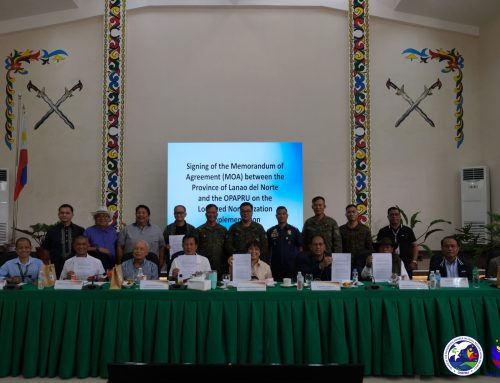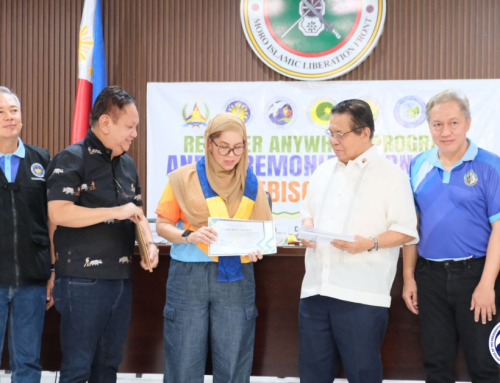PASIG CITY — The Inter-Cabinet Cluster Mechanism on Normalization (ICCMN) has approved the proposed Transitional Justice and Reconciliation (TJR) roadmap, a key component of the normalization track of the Comprehensive Agreement on the Bangsamoro (CAB), on Tuesday, March 30.
Government of the Philippines panel member and focal person for the sub-cluster on TJR, Office of the Presidential Adviser on the Peace Process (OPAPP) Assistant Secretary Wilben M. Mayor underscored that the TJR is considered “the heart of the [Bangsamoro] peace process.”
Mayor said that the TJR roadmap “is a living document that is intended to guide government programs and interventions on TJR and a set of deliverables that can realistically be started and achieved within the Duterte administration.”
“This will demonstrate the government’s commitment in responding to the recommendations cited in the report of the Transitional Justice and Reconciliation Commission (TJRC),” he added.
The Normalization Program of the CAB provides for a comprehensive strategy to promote healing and reconciliation among communities in the Bangsamoro that have been affected by armed conflict.
An integral part of this approach was the establishment of TJRC in 2014 during the meeting held between the GPH and Moro Islamic Liberation Front (MILF) Peace Panels in Kuala Lumpur, Malaysia.
The Commission was mandated to undertake a study and recommend to the Panels the appropriate mechanisms to correct historical injustices and address legitimate grievances, human rights violation, and marginalization through land dispossession.
The ICCMN sub-cluster on TJR was created to formulate a roadmap that shall serve as a guide to carry out the recommendations made by the TJRC.
The ICCMN, as a whole, aims to discuss ways to further accelerate the implementation of the normalization track of the CAB.
In particular, the body was established to ensure the timely, appropriate, and efficient delivery of the Normalization Program through close collaboration and greater synergy among national line agencies.
Security aspect in full blast
Meanwhile, GPH Implementing Panel Chair and OPAPP Undersecretary David B. Diciano reported the milestones that have been achieved under the security component of the Normalization Program.
“We have already trained and constituted fifteen (15) Joint Peace and Security Teams (JPSTs) composed of 450 members from the Armed Forces of the Philippines, the Philippine National Police and the MILF’s Bangsamoro Islamic Armed Forces or BIAF,” Diciano said.
The JPSTs serve as peacekeeping forces in areas mutually agreed by the national government and the MILF.
“Out of the 15 teams trained, eight JPSTs have been deployed in mutually identified conflict-affected areas by the parties,” he added.
Since their creation, JPSTs have played a vital role in ensuring the security of the residents within the six government-acknowledged MILF camps during the second phase of the decommissioning process.
These teams will continue to perform their mandate until the Exit Agreement between the Government of the Philippines and the MILF is signed.
Diciano also highlighted the major accomplishments of the National Task Force for the disbandment of private armed groups (DPAGs), which include the disbanding of six private armed groups in Mindanao.
“The persistence of the NTF for DPAGs have yielded positive results with the disbanding of six PAGs in Western Mindanao in March 2021,” he said.
“With this, the NTF-DPAGs aim to strengthen its efforts and intensify the campaign of its Task Group. The NTF DPAG shall also endeavor to garner the pledge of commitment of partner LGUs to bolster initiatives against PAGs,” Diciano added.
Socioeconomic interventions
For his part, Joint Normalization Committee Co-chair Ariel Hernandez discussed the socioeconomic interventions to be provided to the decommissioned MILF combatants, their families and their communities.
These interventions include the provisions of social protection, capacity development, livelihood and employment, and infrastructure.
Under social protection, the MILF combatants were given immediate cash assistance right after their decommissioning. They were also provided with health coverage and civil registration.
Among the activities under capacity development are values transformation, Alternative Learning System, study grant program, and technical-vocational education training.
According to Hernandez, livelihood and employment will also be provided to the former combatants “to ensure their daily needs and dreams for the future can become a reality.”
This component includes livelihood investment support, social entrepreneurship, short-term employment will be provided.
On the other hand, housing assistance, and other community-based interventions will be provided under the infrastructure component of the socioeconomic program.
Aside from these interventions, Hernandez also discussed the initiatives being carried out to transform MILF camps as show windows of peace and development.
The Joint Task Force on Camps Transformation (JTFCT) partnered with the Bangsamoro Autonomous Region in Muslim Mindanao Regional Planning and Development Office (BARMM-RPDO) to craft development plans for the six previously-acknowledged MILF camps.
The Camps Transformation Plan formulated by the JTFCT and the BARMM-RPDO, which covers the six MILF camps, was approved last February 16, 2021.
“It is a 6-year plan (2021-2026) that will provide the overall process and direction for camps transformation and serve as a roadmap to implement the transformation of six MILF camps into peaceful and productive communities,” he said.
Confidence-building measures
The Normalization Program also provides for confidence-building measures which include the provision of safe conduct passes, the organization and operationalization of the Presidential Committee on the Grant of Bail, Release and Pardon (PCBRep), and amnesty for the MILF members.
The House of Representatives’ Committees on Justice, and National Defense and Security recently approved the House Concurrent Resolutions granting amnesty to members of the MILF, Moro National Liberation Front (MNLF), Rebolusyonaryong Partido ng Manggagawa ng Pilipinas/Revolutionary Proletarian Army/Alex Boncayao Brigade (RPMP-RPA-ABB), and the Communist Terrorist Group (CTG).
This was in response to the Presidential Proclamations 1090, 1091, 1092 and 1093 granting amnesty to MILF, MNLF, RPM-P/RPA/ABB-TPG, and CTG members who committed crimes during the course of their armed struggle.
ICCMN Co-chair Cabinet Secretary Karlo Nograles thanked the ICCMN members for throwing their full support behind the implementation of the normalization track.
“We recognized the accomplishments that the ICCMN has achieved during the past year despite the ongoing pandemic. Collaboration and concerted action of various government agencies paved the way for the implementation of specific aspects of the normalization program,’’ Nograles said.
He also called on the ICCMN members to continue supporting the Normalization Program.
“Let us sustain our focus to continuously make our thrust in ensuring timely and appropriate and efficient delivery of the normalization program. 2021 for the ICCMN will be marked with invigorated determination as we continue laying the foundation for a solid Bangsamoro government.”
For his part, Presidential Peace Adviser and ICCMN Co-Chair Carlito G. Galvez Jr lauded the multi-agency body for their efforts in accelerating the implementation of the Normalization Program.
“These milestones were achieved due to the steadfast commitment and support of all stakeholders — the Bangsamoro and national governments, civil society organizations, as well our local and international peace partners,” Galvez said.
“Through the support of ICCMN member-agencies, there is no doubt that we shall accomplish the tasks ahead such as the implementation of socioeconomic programs for the decommissioned combatants and their families,” he added. ###
[Cover photo is a file photo from the 2nd ICCMN meeting held on July 25, 2019]












